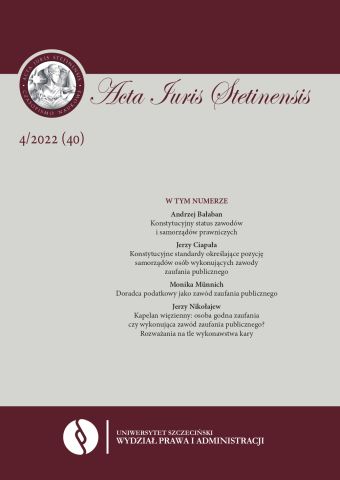Udział przedstawicieli zawodów świadczących pomoc prawną w dostępie do tych zawodów
Participation of members of legal counselling professions in access to practicing these professions
Author(s): Monika KępaSubject(s): Law, Constitution, Jurisprudence, Administrative Law
Published by: Wydawnictwo Naukowe Uniwersytetu Szczecińskiego
Keywords: advocate; attorney-at-law; legal counselling; access to profession; professional self-governments
Summary/Abstract: The aim of this article is to analyse the normative regulations on the participation of advocates (adwokaci) and attorneys-at-law (radcy prawni) in stages of qualification to become members of these professions. It formulates de lege lata and de lege ferenda proposals on the matter of the nature and significance of the activities carried out by legal counselling professionals for obtaining access to these professions. This issue has not been examined in detail in legal science, as the studies conducted so far focus primarily on the competences of the authorities of self-governments of individual professions of public trust. The research methods used in this study are relevant to its purpose. An examination of the law in force is carried out and so is an analysis of the established line of judicial decisions and the relevant literature. Moreover, the study has employed an intra-system comparative method to identify possible differences between rights of advocates and attorneys-at-law. Based on the research carried out, it has been concluded that while it is admissible that the content of examination questions for the professional training entrance examinations be identical, it is appropriate to differentiate exam assignments for advocate and attorney-at-law qualification examinations. The comments on the law as it stands (de lege lata) point to the broad array of powers exercised by the Minister of Justice at various stages of access to legal professions. The fundamental de lege ferenda proposal formulated on the basis of this analysis is to make changes to the normative regulations aimed at increasing the participation of practitioners in various stages of the qualification procedure. Advocates and attorneys-at-law who are members of the relevant professional self-governments practice professions of public trust of utmost importance to individuals, the general public and the state. The provision of legal assistance depends on meeting high requirements, including those of substantive nature. It is therefore reasonable to assume that it is members of the professions themselves who are most predisposed to assess the suitability of candidates to practice these professions.
Journal: Acta Iuris Stetinensis
- Issue Year: 2022
- Issue No: 40 (4)
- Page Range: 71-86
- Page Count: 16
- Language: Polish

